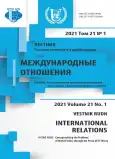Regional Complex of Southeast Asia: A Case of Applied Analysis Focused on the Situation in Myanmar
- 作者: Efremova K.A.1
-
隶属关系:
- MGIMO University
- 期: 卷 21, 编号 1 (2021): Conceptualizing the Problems of World Politics through the Prism of IR Theory
- 页面: 33-48
- 栏目: THEMATIC DOSSIER
- URL: https://journal-vniispk.ru/2313-0660/article/view/320328
- DOI: https://doi.org/10.22363/2313-0660-2021-21-1-33-48
- ID: 320328
如何引用文章
全文:
详细
This paper uses the method of applied analysis of regional complexes developed at the Centre for Comprehensive Chinese Studies and Regional Projects, MGIMO University (Moscow, Russia). Its scientific relevance is defined by the importance of understanding the international and political situation in and around Myanmar. The aim of this study is a scientific exploration of the Rohingya crisis by means of applied methods of regional analysis, designed by the author. This methodology aims to trace scenarios of the development of international and political situations in the region based on the types of interactions within the Southeast Asian regional complex. The article offers the author’s own definition of regional complex that builds on the works of Alexei D. Voskressenski, introduces an algorithm of scenario analysis, outlines six “ideal” types of regional complexes, and defines stable and unstable types of regional complexes. The first part of the article is devoted to current approaches in the study of regional problems in International Relations and World Regional Studies; the second part describes the author’s conception of applied international political analysis of regional complexes; and the third part contains an example of the application of scenario analysis to specific regional and domestic affairs - in this case, the contemporary situation in Myanmar’s Rakhine State. The research yields the following results: 1) by using a combination of the methods of news monitoring and event analysis, the author collected information on political processes in Rakhine over the last five years; 2) this information was arranged according to the matrix compiled by the author, which characterized the situation development according to the negative (-5…-1) and positive (+1…+5) scenarios; 3) based on the results of the aforesaid analysis, the author comes to a conclusion on the character and intensity of the Rohingya crisis and describes possible ways of its settlement.
作者简介
Ksenia Efremova
MGIMO University
编辑信件的主要联系方式.
Email: efremova@mgimo.ru
PhD in Political Science, Associate Professor, Asian and African Studies Department, Research Fellow, Center for Comprehensive Chinese Studies and Regional Projects
Moscow, Russian Federation参考
- Ayoob, M. (1999). From Regional System to Regional Society: Exploring Key Variables in the Construction of Regional Order. Australian Journal of International Affairs, 53(3), 247—250.
- Buzan, B., & Wæver, O. (2003). Regions and Powers: The Structure of International Security. Cambridge: Cambridge University Press.
- Buzan, B., Waever, O., & de Wilde, J.H. (1997). Security: A New Framework of Analysis, Boulder, Co: Lynne Rienner.
- Efremova, K.A. (2018). The Rohingya People Crisis: Domestic, Regional and Global Aspects. Southeast Asia: Actual Problems of Development, (1), 144—160. (In Russian).
- Efremova, K.A. (2019). Comparative Analysis of Theoretical Approaches to Definition of the Regional Complex. Comparative Politics Russia, 10(2), 5—19. (In Russian). doi: 10.24411/2221-3279-2019-10013
- Efremova, K.A. (2020). The Notion of Regional Complex: From Theory to Praxis. In R.A. Pupykin & K.P. Piliugina (Eds.), Materials of the 10th Commemorative South-Russian Convent of Political Scientists “Political Power at the Condition of Social Turbulence: Regional and Global Aspects”. Rostov-on-Don — Taganrog: Izdatel’stvo Iuzhnogo federal’nogo universiteta publ. (pp. 61—64). (In Russian).
- Egreteau, R. (2011). A Passage to Burma? India, Development, and Democratization in Myanmar. Contemporary Politics, 17(4), 467—486.
- Hettne, B. (1999). The New Regionalism: A Prologue. In B. Hettne, A. Inotai & O. Sunkel (Eds.), Globalism and the New Regionalism. London — New York: Palgrave Macmillan (pp. xv—xxxvi).
- Khrustalev, M. (2006). Two Russian Schools in IR Theory in Russia. International Trends, 2(4), 119—128. (In Russian).
- Lake, D.A. (2009). Regional Hierarchy: Authority and Local International Order. Review of International Studies, 35(1), 35—58.
- Pozdniakov, E.A. (1976). The System Approach and International Relations. Moscow: Nauka publ. (In Russian).
- Primakov, E.M., & Khrustalev, M.A. (2006). Situation Analyses: A Methodology. Moscow: Nauchno-obrazovatel’nyi forum po mezhdunarodnym otnosheniyam, MGIMO MID Rossii publ. (In Russian).
- Simoniya, A.A. (2017). The Exodus of the Bengali-Rohingya: Who is to Blame and What to Do? Southeast Asia: Actual Problems of Development, (36), 124—139. (In Russian).
- Simoniya, A.A. (2018). Myanmar: Non-Resolved Political Problems of the NLD Government. Southeast Asia: Actual Problems of Development, 4(41), 100—111. (In Russian).
- Simoniya, A.A. (2020). Hague Trial: Aung San Suu Kyi Denies Genocide in Myanmar. Southeast Asia: Actual Problems of Development, 46(1), 115—126. (In Russian). doi: 10.31696/2072-8271-2020-1-1-46-115-126
- Voskresenskii, A.D. (2002). The Subject and Goals of Studying Regional Subsystems of International Relations. In A.D. Voskresenskii (Eds.), East / West: Regional Subsystems and Regional Problems of International Relations. Moscow: ROSSPEN publ. (pp. 3—14). (In Russian).
- Voskresenskii, A.D., Koldunova, E.V., & Lunev, S.I. (2014). Macroregionalization and Regional Complexes. Types of Regions. Regional Subsystems and Regional Order. In A.D. Voskresenskii (Eds.), World Regional Studies. Moscow: Magistr — INFRA-M publ. (pp. 176—200). (In Russian).
- Whittlesey, D., James, P.E., Malin, J., Jones, C.F., McCarty, H.H. et al. (1952). Regional Study with Special Reference to Geography. Washington: National Academy of Sciences — National Research Council.
- Zaw, A. (2019). Tayo-Myanma sibwaye zinggyang lanma thomahou Myanma nainggang-i deytha-twin mahabyuha tanbou ahleapyaung [China — Myanmar Economic Corridor, or the Shifting Strategic Importance of Myanmar in the Region]. Myanma yeya, (11), 161—190. (In Burmese).
- Zhang, X., Hu, Z., He, Y., & He, Q. (2018) Mianbei chongtu dui “Yi dai yi lu” zai Mian tuijinde yingxiang jili [The Conflict in North Myanmar’s Impact on the Realization of “One Belt, One Road” Initiative in Myanmar]. Shijie dili yanjiu, 2(27), 26—35. (In Chinese).
补充文件









